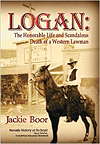
Logan: The Honorable Life and Scandalous Death of a Western Lawman, by Jackie Boor, Cable Publishing, Brule, Wis., 2014, $25.95
Born in Franktown, Nevada in 1861, Thomas Walter Logan grew up to see the territory achieve statehood, undergo a series of booms and busts and enter the 20th century at a time of profound change for the nation. Amid that change, on January 3, 1899, Tom Logan, the 37-year-old father of six daughters and a son, was sworn in as the 11th sheriff of Nye County. Operating from the county seat of Belmont, his task was to uphold the law in a region of mountains and desert the size of New Hampshire and New Jersey combined.
In contrast to so many lawmen who shot first and asked questions later, Sheriff Logan performed his duties with gunplay strictly as a last resort. The Tonopah Daily Sun recorded an incident in which a drunken Wyatt Earp slapped wife Josie and, when a young miner tried to intervene, ran to the saloon he then owned in town and returned with two six-guns in hand. “Tom Logan was told of the row,” the account said, “and he hastened at once to the scene. Pushing his way to the center of the mass, he caught Earp by arm and, without raising his voice, talked him into giving up his guns.…It was a common occurrence. The man did not know what fear was, and he always tried to stop trouble by peaceful means, although there was not better hand with a gun in this country than he.”
It is just another of history’s sad ironies that this lawman, reputedly without fear and without reproach, met his end in a house of ill-repute, with whose madam he had spent the night, and who he was protecting from an unruly customer who violently refused to leave on the morning of April 7, 1906. After Logan was shot five times by Walter Barieau, his last act, true to form, was to prevent the piano player who came to his aid from shooting his assailant, thus averting further bloodshed.
Jackie Boor’s biography uses a wealth of available documentation to revive the memory of her great-grandfather and re-create his life and times, his family and the Nevada county that grew up around him. She bestows equally ample details upon his postmortem—consequences to the family and the people he knew, and the trial of the murderer, whose outcome many thought as astonishing and scandalous as Logan’s death. For those who may have overlooked him, as well as the history of the state he served, Logan should catch you up on both counts.
Jon Guttman
Originally published in the June 2015 issue of Wild West.




